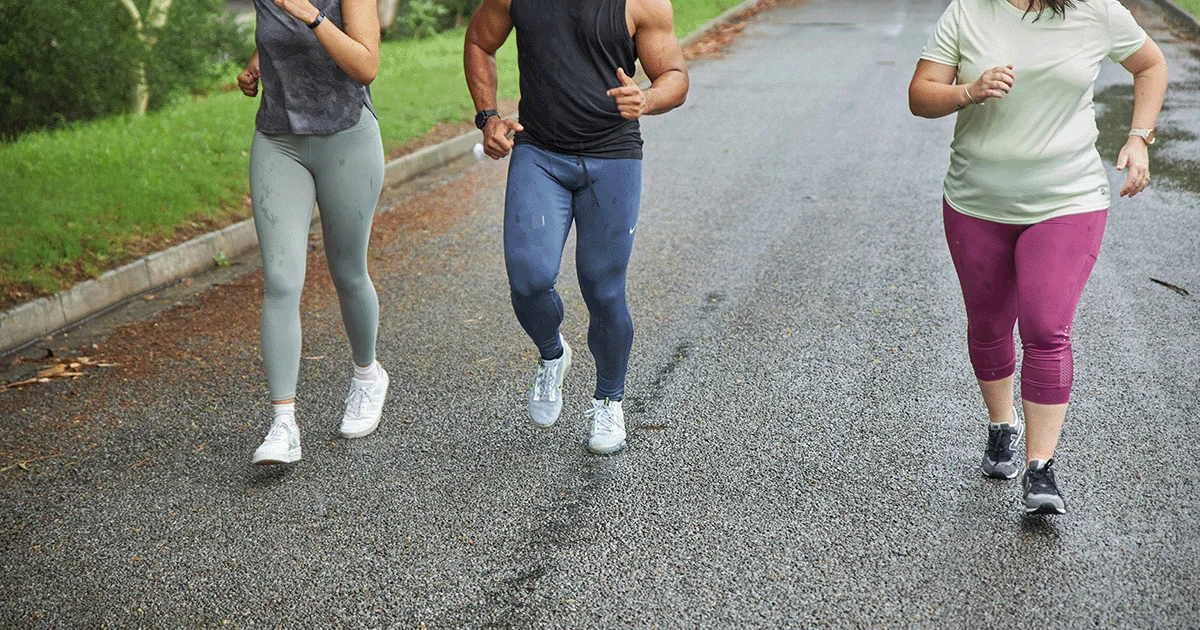Key takeaways
Saunas increase sweating and heart rate, which can cause you to burn a few calories and lose a few pounds of water weight, but there’s no evidence this translates to long-term weight loss.
Although saunas are generally safe for many people and may help decrease stress and improve overall well-being, there are risks to using saunas, and they’re not right for everyone. People with heart conditions may be advised by their healthcare provider to avoid saunas.
Lasting and safe weight loss solutions include a calorie-restricted diet, regular exercise, good quality sleep, and potentially weight loss medications (if appropriate).
Here's what we'll cover
Here's what we'll cover
Here's what we'll cover
Key takeaways
Saunas increase sweating and heart rate, which can cause you to burn a few calories and lose a few pounds of water weight, but there’s no evidence this translates to long-term weight loss.
Although saunas are generally safe for many people and may help decrease stress and improve overall well-being, there are risks to using saunas, and they’re not right for everyone. People with heart conditions may be advised by their healthcare provider to avoid saunas.
Lasting and safe weight loss solutions include a calorie-restricted diet, regular exercise, good quality sleep, and potentially weight loss medications (if appropriate).
If you enjoy relaxing in the heat, you may love the Finnish wellness practice of dry sauna bathing. And while there are real health benefits of sauna bathing (meaning sitting in a small room where there is dry heat), you may also wonder: Do saunas help you lose weight? Below, we’ll explore saunas’ weight loss potential (both in the short- and long-term), risks, safety tips, other actually proven weight loss strategies, and more.
Do saunas help you lose weight?
Unfortunately, not really. While saunas do appear to help you lose a minimal amount of water weight temporarily, saunas offer few long-term weight loss benefits. Here’s what the research shows:
Saunas put your body under thermal stress
When you’re in a high-heat environment, your body has to work harder to keep your core temperature regulated. Sauna bathing triggers sweating, your body’s main cooling mechanism, and it increases your heart rate, which improves blood flow. This process may slightly bump up your calorie burn.
One small study showed that men with overweight burned between 73 to 134 calories in 10 minutes of sauna usage. The number of calories your body burns will depend on a range of factors, but this study concluded that people with a higher body mass, and more body fat and muscle tend to expend more calories in a sauna.
In addition to increasing sweating, sauna-related calorie burn could be related to the rise in heart rate. Heart rate is influenced by how long you stay in the sauna, your age, sex, and physical fitness.
Is this form of minimal calorie-burn a good long-term solution for weight loss? Unlikely.
Saunas encourage you to lose water weight
Due to the heat-related sweat response, your body loses fluid when in a sauna, which can be reflected on the scale as weight loss. Essentially this is a state of being dehydrated. The men in the previously mentioned study lost about 1.4 pounds after 40 total minutes in the sauna due to sweat. However, since this is water weight loss, it is a temporary effect. Once you rehydrate, you’ll replenish the lost fluids, and you can expect your weight to rebound.
Saunas may reduce stress
While saunas may not directly help much with long-term weight loss, stress reduction is one indirect way they could help with the overall picture.
If sitting in the heat is something you enjoy, time in a sauna can help you relax and can act as a wonderful buffer to stress. Increased stress triggers the production of cortisol, a hormone that can promote increased appetite and storage of excess fat in the belly. Decreasing stress may then help trim abdominal fat, leading to weight loss. And practicing stress management has been shown to help reduce BMI. What’s more, stress has an effect on what you eat, and a reduction in stress can help you stick to a healthy, balanced diet.
Possible risks of using saunas for weight loss
Overall, sauna bathing is largely considered safe for most people, especially for those who don’t have issues with their heart health. However, there are a few risks to keep in mind:
Dehydration
If you sweat more than you sip, you can be at risk for dehydration. Along with water loss, you also lose electrolytes (like sodium and potassium) when you sweat, which are essential for normal muscle and nerve function. Symptoms of dehydration include:
Increased thirst
Dry mouth
Weakness or fatigue
Decrease in urination (or dark-colored urine)
Dizziness or lightheadedness
Muscle weakness or cramps
Heart palpitations
Confusion or difficulty concentrating
Irritability
Hyperthermia
One complication that can sometimes go along with dehydration is hyperthermia, a condition also known as heat illness, or a dangerously elevated core body temperature. The effects of hyperthermia can range from heat exhaustion to heat stroke, a dangerous condition that impairs your nervous system, causing confusion, loss of muscle control, delirium, or even seizures.
Alcohol use
Yes, sometimes we like to pair one de-stressing activity with another. However, avoid drinking alcohol inside a sauna, as imbibing in a sauna can increase the risk of low blood pressure (which can cause fainting), abnormal heart rhythms (arrhythmia), and sudden death, especially if you have pre-existing cardiovascular disease.
Who should not use a sauna for weight loss?
Saunas are not safe for everyone. Avoid sauna bathing if you have:
Unstable angina
Experienced a recent heart attack
Severe aortic stenosis
In addition, if you are prone to orthostatic hypotension (low blood pressure upon standing), you should be cautious about getting into a sauna, as the heat may increase your risk of fainting.
If you have a history of cardiovascular disease, sauna use might still be safe for you (and some studies even suggest potential benefits for heart health), but you should check with your healthcare provider before stepping into one.
This list is not comprehensive. Always speak to your healthcare provider before making any significant changes to your routine.
Tips for safely using saunas for weight loss
If you’re interested in adding sauna use to your weight loss routine, ideally alongside a balanced diet, regular exercise, and other healthy lifestyle habits, here’s how to stay safe while doing it:
Consult your healthcare provider
If you have any questions about whether you should be using a sauna, check with your healthcare provider, especially if you have a heart condition. Your provider may give you safe parameters for using a sauna, such as duration, temperature, and frequency.
Hydrate
Prevent dehydration by drinking fluids before, during, and after the sauna. You can even bring a water bottle into the sauna with you (or ask if the facility offers fillable paper cups) to easily sip while you sauna.
Limit your time
Studies have used 10 minutes as a starting point for sauna use, even for people who didn’t regularly use a sauna. Research participants also took regular breaks while using the sauna to allow themselves to cool down. (For example, being in the sauna for 10 minutes, followed by a five-minute break). If you’re feeling faint or having sensations of heart racing, it’s definitely time to get out — but taking regular breaks and staying hydrated should prevent you from ever reaching that point.
Avoid alcohol use
It’s worth repeating: Due to the dangers associated with drinking alcohol in a high-heat environment like a sauna, be sure to go into a sauna sober and never drink alcohol while relaxing in a sauna.
Should you use a sauna before or after a workout?
If you’re going to pair your sauna usage with a workout, it’s better to exercise first, then go sit in a sauna.
While there isn’t research comparing calorie burn or weight loss between pre- or post-exercise sauna sessions, there is a risk of dehydration in a sauna, and dehydration has been shown to decrease physical performance. In a state of dehydration, you may find it more difficult to push through a workout, and subpar exercise sessions could impact your ability to manage your weight.
Last thing: There is some evidence that the physiological stress from sauna bathing may interfere with recovery in competitive athletes — if that’s you, you may want to rethink adding sauna sessions into your routine.
Alternatives to saunas for weight loss
Given that sauna bathing isn’t an evidence-based weight loss method, you’d be better off focusing on approaches known to work. Strategies for safe, effective weight loss include the following:
Reduce calories: There are many types of diets that can be effective for weight loss — and there’s no one “perfect” diet — but the most important factor is maintaining a calorie deficit.
Get moving: Physical activity is the perfect complement to following a healthy, balanced diet. Research suggests that as little as 30 minutes per week of aerobic exercise could be effective in reducing weight and body fat in those with overweight or obesity. That said, the researchers (and most experts) recommend 150 to 300 minutes per week of moderate intensity exercise for the best results.
Prioritize sleep: Believe it or not, one of the best things you can do for your weight is get a good night’s rest. People who said that their sleep quality was good on average were 33% more likely to be successful in weight loss. Aim for at least seven hours per night — the number linked to more weight loss success.
Consider weight loss medications: Weight loss medications like Wegovy, Zepbound, Xenical, Alli, phentermine, Qsymia, or Contrave have all been shown to promote weight loss. These medications are not right for everyone, so ask your healthcare provider if you’re a good candidate, and which drug might be right for you. Have a thorough discussion of the risks and benefits before making a decision.
Bottom line
Going into a sauna can be a really nice way to relax and reduce stress. Spending time in the heat can also be a beneficial source of physiological stress that causes your body to work harder to keep itself cool. But does that mean spending time in a sauna leads to weight loss? Unfortunately, it probably isn’t an effective weight loss strategy.
Saunas increase sweating, which can help you lose water weight. However, this effect is temporary: Once you rehydrate and replenish lost fluids, your weight will go back to baseline.
Due to increases in heart rate, you may burn a few calories in a sauna, though research has not linked that to meaningful weight loss over time.
For most people, sauna bathing is a healthy, safe activity, but it’s not right for everyone. If you have a history of a heart condition or are concerned whether a sauna is safe for you, get the go-ahead from your healthcare provider before starting.
Make sure to stay hydrated by drinking water before, during, and after your sauna session. Leave if you start to feel lightheaded. Avoid alcohol use in a sauna.
Habits that promote healthy weight management include following a calorie-deficit diet, getting regular physical activity, and getting at least seven hours of high-quality sleep. Weight loss medications can help, too, if appropriate for you.
Frequently asked questions (FAQs)
Is a sauna good for losing belly fat?
Unfortunately, we don’t know. There isn’t evidence that sauna bathing will help your body shed abdominal fat. We need more research on how regular sauna use may help burn fat and affect body composition.
How much weight can you lose in a sauna in 30 minutes?
A small study found that male participants lost about 1.4 pounds in a total of 40 minutes of sauna usage. This was from water weight due to sweating, and weight lost through sweat does not last. Once you rehydrate after drinking fluids, you’ll be back to your original weight.
How many calories do you burn in a 30-minute sauna?
In research that looked at 10 minutes of sauna use, men burned between 73 to 134 calories. Those with the highest body weight, body fat, and muscle burned up to 153 calories during 10 minutes.
Can you lose 20 pounds from the sauna?
There is no evidence that people can lose 20 pounds from using the sauna alone. If you are aiming to lose 20 pounds or more, you’d want to consider changing your diet to get into a calorie deficit, incorporating physical activity into your routine, improving your sleep, and potentially talking to your healthcare provider about weight loss medications (if you qualify).
DISCLAIMER
If you have any medical questions or concerns, please talk to your healthcare provider. The articles on Health Guide are underpinned by peer-reviewed research and information drawn from medical societies and governmental agencies. However, they are not a substitute for professional medical advice, diagnosis, or treatment.
Wegovy Important Safety Information: Read more about serious warnings and safety info.
Zepbound Important Safety Information: Read more about serious warnings and safety info.
References
Adam, T. C. & Epel, E. S. (2007). Stress, eating and the reward system. Physiology & Behavior, 91(4), 449–458. doi: 10.1016/j.physbeh.2007.04.011. Retrieved from https://pubmed.ncbi.nlm.nih.gov/17543357/
Carlton, A. & Orr, R. (2015). The effects of fluid loss on physical performance: A critical review. Journal of Sport and Health Science, 12(4). doi: 10.1016/j.jshs.2014.09.004. Retrieved from https://www.researchgate.net/publication/271773635_The_effects_of_fluid_loss_on_physical_performance_A_critical_review
Hannuksela, M. L. & Ellahham, S. (2001). Benefits and risks of sauna bathing. The American Journal of Medicine, 110(2), 118–126. doi: 10.1016/s0002-9343(00)00671-9. Retrieved from https://pubmed.ncbi.nlm.nih.gov/11165553/
Hussain, J. & Cohen, M. (2018). Clinical effects of regular dry sauna bathing: a systematic review. Evidence-Based Complementary and Alternative Medicine : eCAM, 2018, 1857413. doi: 10.1155/2018/1857413. Retrieved from https://pmc.ncbi.nlm.nih.gov/articles/PMC5941775/
Jayedi, A., Soltani, S., Emadi, A., et al. (2024). Aerobic exercise and weight loss in adults: a systematic review and dose-response meta-analysis. JAMA Network Open, 7(12), e2452185. doi: 10.1001/jamanetworkopen.2024.52185. Retrieved from https://pubmed.ncbi.nlm.nih.gov/39724371/
Kim, J. Y. (2021). Optimal diet strategies for weight loss and weight loss maintenance. Journal of Obesity & Metabolic Syndrome, 30(1), 20–31. doi: 10.7570/jomes20065. Retrieved from https://pmc.ncbi.nlm.nih.gov/articles/PMC8017325/
Laukkanen, T., Khan, H., Zaccardi, F., & Laukkanen, J. A. (2015). Association between sauna bathing and fatal cardiovascular and all-cause mortality events. JAMA Internal Medicine, 175(4), 542–548. doi: 10.1001/jamainternmed.2014.8187. Retrieved from https://pubmed.ncbi.nlm.nih.gov/25705824/
Laukkanen, J. A., Laukkanen, T., & Kunutsor, S. K. (2018). Cardiovascular and other health benefits of sauna bathing: a review of the evidence. Mayo Clinic Proceedings, 93(8), 1111–1121. doi: 10.1016/j.mayocp.2018.04.008. Retrieved from https://pubmed.ncbi.nlm.nih.gov/30077204/
Morris, A. & Patel, G. (2023). Heat stroke. StatPearls. Retrieved from https://www.ncbi.nlm.nih.gov/books/NBK537135/
Podstawski, R., Boraczyński, T., Boraczyński, M., et al. (2014). Sauna-induced body mass loss in young sedentary women and men. The Scientific World Journal, 2014, 307421. doi: 10.1155/2014/307421. Retrieved from https://onlinelibrary.wiley.com/doi/10.1155/2014/307421
Podstawski-a, R., Borysławski, K., Clark, C. C. T., et al. (2019). Correlations between repeated use of dry sauna for 4 x 10 minutes, physiological parameters, anthropometric features, and body composition in young sedentary and overweight men: health implications. BioMed Research International, 2019, 7535140. doi: 10.1155/2019/7535140. Retrieved from https://onlinelibrary.wiley.com/doi/10.1155/2019/7535140
Podstawski-b, R., Borysławski, K., Pomianowski, A., et al. (2022). Physiological response to thermal stress in obese vs. non-obese physically inactive men. Biology, 11(3), 471. doi: 10.3390/biology11030471. Retrieved from https://pmc.ncbi.nlm.nih.gov/articles/PMC8945003/
Skorski, S., Schimpchen, J., Pfeiffer, M., et al. (2019). Effects of postexercise sauna bathing on recovery of swim performance. International Journal of Sports Physiology and Performance, 15(7), 934–940. doi: 10.1123/ijspp.2019-0333. Retrieved from https://www.researchgate.net/publication/338123555_Effects_of_Postexercise_Sauna_Bathing_on_Recovery_of_Swim_Performance
Taylor, K. & Tripathi, A. K. (2025). Adult dehydration. StatPearls. Retrieved from https://www.ncbi.nlm.nih.gov/books/NBK555956/
Thomson, C. A., Morrow, K. L., Flatt, S. W., et al. (2012). Relationship between sleep quality and quantity and weight loss in women participating in a weight-loss intervention trial. Obesity (Silver Spring, Md.), 20(7), 1419–1425. doi: 10.1038/oby.2012.62. Retrieved from https://pmc.ncbi.nlm.nih.gov/articles/PMC4861065/
Wasserman, D. D., Creech, J. A., & Healy, M. (2022). Cooling techniques for hyperthermia. StatPearls. Retrieved from https://www.ncbi.nlm.nih.gov/books/NBK459311/
Xenaki, N., Bacopoulou, F., Kokkinos, A., et al. (2018). Impact of a stress management program on weight loss, mental health and lifestyle in adults with obesity: a randomized controlled trial. Journal of Molecular Biochemistry, 7(2), 78–84. Retrieved from https://pmc.ncbi.nlm.nih.gov/articles/PMC6296480/














